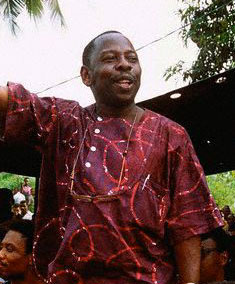Kenule, or Ken, Saro-Wiwa was an environmental activist, author, and television producer. He was born in Bori, a small town in the Niger Delta; his father, Jim Wiwa, was a chief of the Ogoni people, an ethnic minority in the Delta region. He received the honorary title “Saro,” meaning “eldest son.”
In the 1950s, Wiwa witnessed the initial entrance of foreign oil companies and the beginning of the extraction of crude oil in the Niger Delta region. Excelling in school at a young age, he left the Niger Delta to attend the Government College in Umuahia in Eastern Nigeria, initially on a scholarship to study English. He then attended the University of Ibadan, where he received an honors degree in English, and edited two of the college newspapers. Wiwa was there when the Nigerian Civil War began in 1967 and for the duration of the war he supported the Nigerian opposition to the Biafrans.
Despite his opposition to the civil war, Wiwa was appointed administrator of the oil depot at Bonny Island in the Niger Delta in 1968. In 1969, he became the regional commissioner for education in the Rivers State Cabinet but was dismissed from his position in 1973 after he began calling for autonomy for the Ogoni people. His writings became increasingly political, bringing national and international attention to the Ogoni’s struggle.
During the mid 1980s, Wiwa primarily concentrated on writing, publishing, and television production. His first book Sozaboy: A Novel in Rotten English, published in 1985, was a fictionalized account of the corrupt Nigerian army during the civil war. In 1989, he released his war diaries in a book titled On a Darkling Plain. He wrote two novels that explored the position of women in Nigerian society, Adaku and Other Stories, published in 1989 and Lemona’s Tale, published posthumously in 1996. Wiwa additionally tried his hand in television. He produced the popular series Basi & Company that ran from 1985 until 1992, when it was canceled by the military dictatorship.
By the early 1990s, Wiwa shifted his focus from literature and television to issues of human rights and environmental preservation, particularly in his home region Ogoniland, the center of crude oil extraction by multinational corporations operating in Nigeria. He established and led the Movement for the Survival of Ogoni People (MOSOP) and relatedly, the campaigns against the Royal Dutch Shell Company, demanding that the company share the profits of oil extraction. In January 1993, Wiwa and the MOSOP lead a series of peaceful marches in which an estimated 300,000 Ogoni people participated. For the first time the marches drew significant international attention to the plight of the Ogoni.
After a series of arrests in 1992 and 1993, Wiwa was among nine Ogoni human rights and environmental activists who were tried in a kangaroo court by the military government of General Sani Abachi and hanged on November 10, 1995. The Royal Dutch Shell Company was implicated in the execution of Ken Saro-Wiwa and on June 8, 2009, the company agreed to a settlement of $15.5 million, ending a series of lawsuits that accused it of financing and providing logistical support for the execution. Despite the settlement, Shell denied any connection to the death of Ken Saro-Wiwa.

